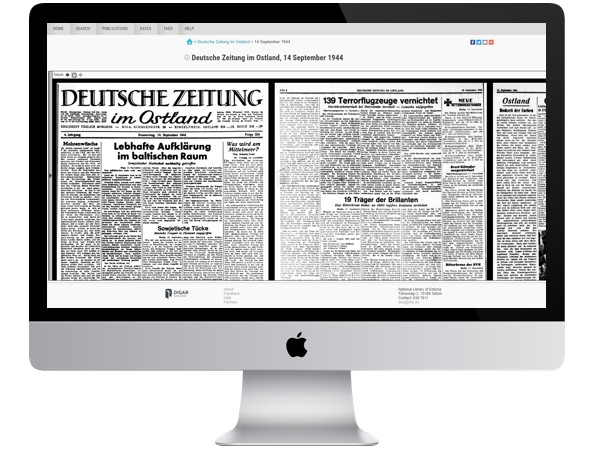Restricting access with Veridian Access Rules
Veridian Access Rules allow online collections (e.g. collections of digitized newspapers) to be restricted in many different ways.
Rules can be applied to restrict access (either to selected content or selected features) to just registered users, just users in a specific group (e.g. those who have paid), or just those accessing the collection from a known IP address range (e.g. a physical library building).
Case study — National Library of Estonia
The National Library of Estonia uses Veridian to display their large online newspaper collection. In addition to older, out-of-copyright newspapers, their collection also contains very recent newspapers, and they continue to add newspapers that were published as recently as a few days ago.
In order to include modern, in-copyright newspapers in their online collection the National Library negotiated agreements with publishers, with restrictions placed on how the in-copyright material may be used. Veridian’s Access Rule functionality is used to enforce those restrictions. Access Rules are very flexible, and can be used to restrict access to both specific content (at the title, issue, or page level) or to specific features, as described later in this article. For the Estonian project though they are used as follows:
- Some newspaper titles are restricted so they may only be viewed by users accessing the collection from within the library buildings. Those titles can still be searched and browsed by anyone, but when attempting to view them users are informed they’re only available from within the library.
- Some newspaper titles are restricted so they can only be viewed by users who are registered and belong to the necessary user group (e.g. library administrators).
- Some newspapers are configured with one or both of the restrictions above, but the restrictions are automatically removed when newspaper issues reach an agreed age. For example, some newspapers are accessible only from within library buildings until they are at least 30 days old, at which time they automatically become available to everyone.
- Veridian’s search systems allow users to search the collection either for all content (including any that is restricted, and which they may not be allowed to view) or to search just for content that isn’t restricted.
More examples of Veridian Access Rules
As noted above, Veridian Access Rules are very flexible, and can be used in many different ways. We’ve listed some examples below, but there are many others.
- Downloading high-res source images or PDFs can be restricted to just administrators.
- Specific newspaper titles, issues, or pages, can be restricted to just users who pay to register.
- Crowdsourcing features like User Text Correction (UTC) can be enabled or disabled for individual newspaper titles.
- In-copyright material can be restricted to only administrators or library patrons, but then automatically become publicly accessible when copyrights expire (e.g. 70 years or 90 years after publication date, depending on copyright laws where the material was published).
- Individual newspapers (or even individual pages) can be temporarily and easily “blocked” and made inaccessible to users.
- Advanced features like metadata editing can be restricted to just administrators, or just users accessing the site from a known IP range (e.g. a library building).

